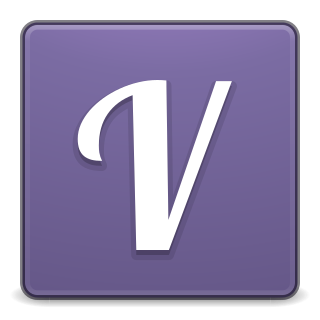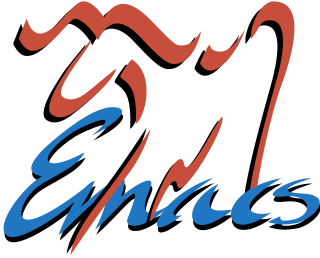
GNU is an extensive collection of free software, which can be used as an operating system or can be used in parts with other operating systems. The use of the completed GNU tools led to the family of operating systems popularly known as Linux. Most of GNU is licensed under the GNU Project's own General Public License (GPL).

The GNU Debugger (GDB) is a portable debugger that runs on many Unix-like systems and works for many programming languages, including Ada, C, C++, Objective-C, Free Pascal, Fortran, Go, and partially others.
A "Hello, World!" program is generally a computer program that outputs or displays the message "Hello, World!". This program is very simple to write in many programming languages, and is often used to illustrate a language's basic syntax. "Hello, World!" programs are often the first a student learns to write in a given language, and they can also be used as a sanity test to ensure computer software intended to compile or run source code is correctly installed, and that its operator understands how to use it.
For people with the surname, see Sather (surname).

Liberty BASIC (LB) is a commercial computer programming language and integrated development environment (IDE). It has an interpreter, developed in Smalltalk, which recognizes its own dialect of the BASIC programming language. It runs on 16- and 32-bit Windows and OS/2.

In computing, internationalization and localization (American) or internationalisation and localisation, often abbreviated i18n and L10n, are means of adapting computer software to different languages, regional peculiarities and technical requirements of a target locale. Internationalization is the process of designing a software application so that it can be adapted to various languages and regions without engineering changes. Localization is the process of adapting internationalized software for a specific region or language by translating text and adding locale-specific components. Localization uses the infrastructure or flexibility provided by internationalization.
A Perl module is a discrete component of software for the Perl programming language. Technically, it is a particular set of conventions for using Perl's package mechanism that has become universally adopted.
Object Pascal is an extension to the programming language Pascal that provides object-oriented programming (OOP) features such as classes and methods.
The GNU Assembler, commonly known as gas or as, is the assembler developed by the GNU Project. It is the default back-end of GCC. It is used to assemble the GNU operating system and the Linux kernel, and various other software. It is a part of the GNU Binutils package.

The FOX toolkit is an open-source, cross-platform widget toolkit, i.e. a library of basic elements for building a graphical user interface (GUI). FOX stands for Free Objects for X.
ProvideX is a computer language and development environment derived from Business Basic in the mid-1980s.

Modern C++ Design: Generic Programming and Design Patterns Applied is a book written by Andrei Alexandrescu, published in 2001 by Addison-Wesley. It has been regarded as "one of the most important C++ books" by Scott Meyers.
Gtk2-Perl is a set of wrappers for the Perl programming language around the GTK and further GNOME libraries. Gtk-Perl is free and open-source software licensed under the GNU Lesser General Public License (LGPL) version 2.1. Developers and interested parties can usually be found on the IRC channel #gtk-perl on irc.gnome.org.

GNU Smalltalk is an implementation of the Smalltalk programming language by the GNU Project.

Vala is an object-oriented programming language with a self-hosting compiler that generates C code and uses the GObject system.

GNU Emacs is a free software text editor. It was created by GNU Project founder Richard Stallman. In common with other varieties of Emacs, GNU Emacs is extensible using a Turing complete programming language. GNU Emacs has been called "the most powerful text editor available today". With proper support from the underlying system, GNU Emacs is able to display files in multiple character sets, and has been able to simultaneously display most human languages since at least 1999. Throughout its history, GNU Emacs has been a central component of the GNU project, and a flagship of the free software movement. GNU Emacs is sometimes abbreviated as GNUMACS, especially to differentiate it from other EMACS variants. The tag line for GNU Emacs is "the extensible self-documenting text editor".
A scripting language or script language is a programming language for a runtime system that automates the execution of tasks that would otherwise be performed individually by a human operator. Scripting languages are usually interpreted at runtime rather than compiled.
Agent-oriented programming (AOP) is a programming paradigm where the construction of the software is centered on the concept of software agents. In contrast to object-oriented programming which has objects at its core, AOP has externally specified agents at its core. They can be thought of as abstractions of objects. Exchanged messages are interpreted by receiving "agents", in a way specific to its class of agents.

Opa is an open-source programming language for developing scalable web applications.

GNU Guix is a functional cross-platform package manager and a tool to instantiate and manage Unix-like operating systems, based on the Nix package manager. Configuration and package recipes are written in Guile Scheme. GNU Guix is the default package manager of the GNU Guix System distribution.










